There’s nothing more frustrating than trying to start your car and the engine just won’t turn over. You hear that tell-tale “click” and then see a cloud of smoke coming from the starter.
A starter should not smoke when trying to start the car. However, the starter generates a lot of heat because a large amount of amperage is required to spin the engine and if something is wrong, the starter will start to smoke.
In this article, we will discuss nine possible causes of starter smoking when trying to start a car. By understanding the root of the problem, you can better troubleshoot and fix it.
- Key Takeaway
- Starter Smoking When Trying To Start The Car
- 1. Blown fuse/relay
- 2. Short circuit
- 3. The starter doesn’t shut off after the car’s engine has ignited
- 4. Oil or grease has dripped onto it
- 5. The brushes are getting close to wearing out
- 6. Bearings are getting hot
- 7. Insulation has broken down
- 8. Corrosion
- 9. Dirt or dust buildup that gets ignited from the heat
- How To Test a Car Starter
- Can I Still Drive My Car If The Starter is Smoking?
- FAQs
- Q: What are the consequences of a smoking starter?
- Q: How can I fix a smoking starter?
- Q: Can a smoking starter be repaired or does it always need to be replaced?
- Q: How long does it take to fix a smoking starter?
- Q: How much does it cost to fix a smoking starter?
- Q: Can I prevent the starter from smoking in the future?
- Q: Is a smoking starter covered by warranty?
- Conclusion and final thoughts
Key Takeaway
- A smoking starter when you try to start the car can be due to a blown fuse/relay, short circuit, starter not turning off, oil or grease on the starter, the brushes getting close to wearing out, the bearings getting hot, insulation has broken down, corrosion, and dirt or dust buildup on the starter.
- Testing a car starter involves several steps including a physical inspection of the starter, checking the battery, performing a voltage test, and conducting a bench test.
Starter Smoking When Trying To Start The Car
![Starter Smoking When Trying To Start The Car [9 Possible Causes]](https://carcarehacks.com/wp-content/uploads/2022/11/Starter-Smoking-When-Trying-To-Start-The-Car-9-Possible-Causes-1024x504.jpg)
A starter that smokes when trying to start the car usually indicates a problem such as a short circuit, damaged wiring, faulty components, or unusual resistance from the engine.
1. Blown fuse/relay
![Starter Smoking When Trying To Start The Car [9 Possible Causes]](https://carcarehacks.com/wp-content/uploads/2022/11/Starter-Smoking-When-Trying-To-Start-The-Car-9-Possible-Causes-1-1024x768.jpg)
A car’s electrical system is made up of a series of circuits that deliver power to the various components of the car.
These circuits are protected by a series of fuses and relays. The purpose of the relays is to switch the circuit on and off in response to an electrical signal. This allows the car’s computer to control the flow of electricity to the various components.
Fuses are designed to protect your vehicle from damage by interrupting the flow of electricity in the event of a short circuit or other problem. A fuse essentially “blows” when too much current is flowing through it, thereby preventing the current from continuing to flow and potentially causing damage.
If your car won’t start and you notice that the starter is smoking, it’s likely due to a blown fuse or a relay. The starter is responsible for supplying power to the engine, and a faulty fuse or a faulty relay can’t control the flow of electricity to the starter and can cause the starter to overheat and smoke.
To check the starter relay, first, locate the fuse box found in the engine bay. It will usually be close to the battery. Once you’ve found it, remove the fuse or disconnect the power supply.
Then, using a multimeter, test the continuity between the two terminals on the starter relay. If there is no continuity, or if the resistance is very high, then the starter relay is most likely blown and needs to be replaced.
2. Short circuit
![Starter Smoking When Trying To Start The Car [9 Possible Causes]](https://carcarehacks.com/wp-content/uploads/2022/11/Starter-Smoking-When-Trying-To-Start-The-Car-9-Possible-Causes-1-1-1024x742.jpg)
A short circuit is a condition where electrical current flows through a circuit without going through the intended load. This can happen if there is a break in the circuit, or if the current takes a “shortcut” through an unintended path.
Short circuits can be dangerous because they can cause fires or electric shocks. In cars, short circuits often occur in the wiring harness, where wires can become frayed or damaged.
If your car starter is smoking when you try to start it, it could be due to a short circuit. This is often caused by damaged wiring or a faulty starter motor.
Damaged wiring can cause the starter to overheat and smoke, potentially leading to a fire. In some cases, the damage may be visible, such as frayed or exposed wires. In other cases, it may be hidden within the starter itself.
Fortunately, there are a few simple steps you can take to check for a short circuit and prevent disaster. First, make sure that all electrical devices and circuits are turned off. Next, locate the area where the short circuit is likely to occur.
This is usually where two wires come into contact with each other. Finally, use a multimeter to test the resistance between the wires. If the multimeter readings are lower than normal, then there is a good chance that a short circuit is present.
3. The starter doesn’t shut off after the car’s engine has ignited
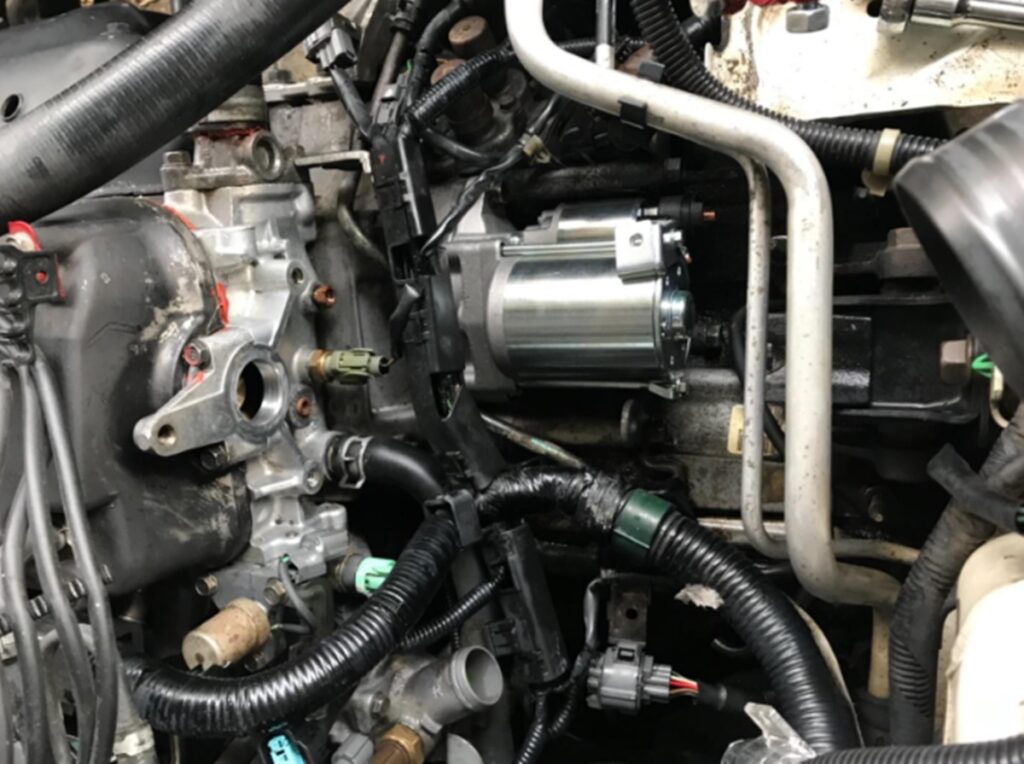
The purpose of a starter in a car is to provide the initial rotation of the engine to start the car. It acts as an electric motor that engages with the flywheel to rotate the engine.
The starter is powered by a battery, which provides electricity to turn the engine over and start the car. When you turn the key in the ignition, it sends a signal to the starter motor to engage and start the car. As soon as the car engine has started, the starter should shut off.
If you see smoke coming from the starter when trying to start the car, it could be because the starter doesn’t shut off after the car’s engine has ignited.
This can cause the starter to overheat and produce a large amount of smoke. If this is the case, it is important to safely disconnect the battery in order for the starter to shut off.
If you notice your car starter smoking, it’s important to take action right away. The first thing you should do is turn off the engine and disconnect the battery.
Then, you’ll want to identify the source of the smoke. If it’s coming from the starter itself, you’ll need to replace it. However, if the smoke is coming from another component, such as the wires or connections, you may be able to simply repair or replace that part.
4. Oil or grease has dripped onto it
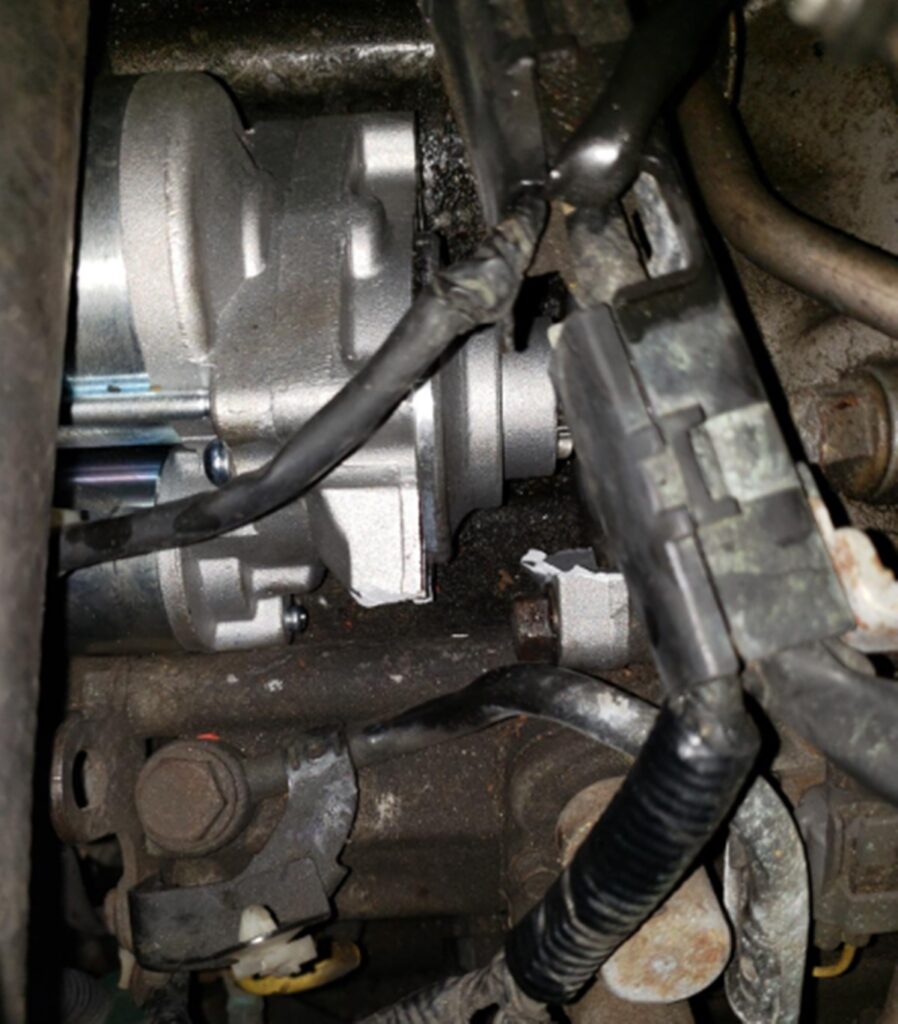
The starter motor is an electric motor that is used to start internal combustion engines. It is turned on by an ignition switch and turns a small gear, which engages with a large gear on the engine.
This causes the engine to rotate and start the car. While doing so, the starter has between 200 and 400 amps flowing through it and it gets hot.
One less well-known cause of starter smoke is oil or grease has dripped onto the starter itself.
Starters generate heat when they start the engine, and if there is some oil or grease on them, it can create a cloud of smoke.
This can happen during an oil change or other maintenance, and it can prevent the starter from engaging properly.
This is why it is important to be careful when you are working on your car. A simple drop of engine oil on the starter can cause it to smoke. It might also damage the wiring and cause further problems.
When I work on my vehicle, I like to place a couple of rugs and towels on the more important parts like the alternator and the starter just in case some grease or oil gets into them.
5. The brushes are getting close to wearing out
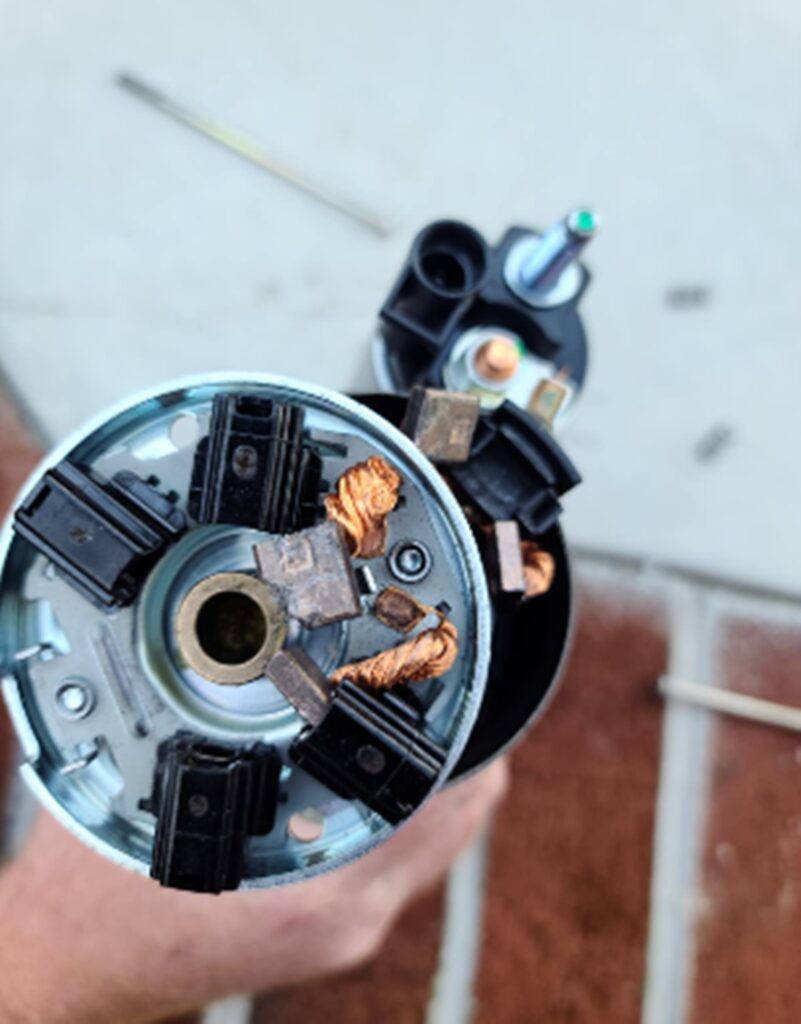
When it comes to car starters, there are two types of brushes: carbon and copper. Carbon brushes are made of graphite, which is a very soft material.
Because of this, carbon brushes wear down quickly and need to be replaced often. Copper brushes, on the other hand, are made of a harder metal that is able to withstand more wear and tear. As a result, copper brushes typically last longer than carbon brushes.
When the brushes are close to wearing out they can become sticky and when you turn on the ignition key, the brushes won’t turn over and can make the starter solenoid and starter motor work harder to start the engine. This can easily result in smoke coming from the starter.
Fortunately, it is easy to check the condition of the brushes and replace them if necessary. First, remove the screws that hold the starter cover in place. Next, disconnect the wire that connects the armature to the commutator. With the cover removed, you should be able to see the brushes.
Inspect them for wear and tear, and if they are damaged, replace them with new ones. Once the new brushes are in place, reattach the starter cover and screw it into place.
Finally, reconnect the armature wire and start your car to test the new brushes. By following these steps, you can easily extend the lifespan of your car starter.
6. Bearings are getting hot
![Starter Smoking When Trying To Start The Car [9 Possible Causes] 4](https://carcarehacks.com/wp-content/uploads/2022/11/Starter-Smoking-When-Trying-To-Start-The-Car-9-Possible-Causes-5-1024x683.jpg)
Most cars nowadays have an electric starter, which is a far cry from the hand-cranked starters of yesteryear. But how do these starters work? Essentially, the starter is an electric motor that is used to turn the engine over, getting it ready to start.
The starter is activated when the driver turns the key in the ignition; this action sends power to the starter solenoid, which in turn activates the starter motor. Then, the starter motor turns the engine flywheel, which gets the engine pistons moving and starts the combustion process.
The starter is responsible for providing the initial rotation to start your engine, and it relies on bearings to help it spin. If these bearings are worn or stuck, they can get hot when the starter is engaged and even cause the starter to smoke.
The starter contains a set of bearings that helps to keep it running smoothly. Over time, these bearings can wear out, causing the starter to become noisy or even fail completely. Fortunately, it is relatively easy to check the condition of the bearings on a car starter.
First, remove the starter from the car. Next, remove the housing that covers the bearings. Inspect the bearings for any signs of damage or wear. If they look damaged, they will need to be replaced. Finally, reassemble the starter and reinstall it in the car.
By following these simple steps, you can ensure that your car’s starter will continue to work properly for years to come.
7. Insulation has broken down
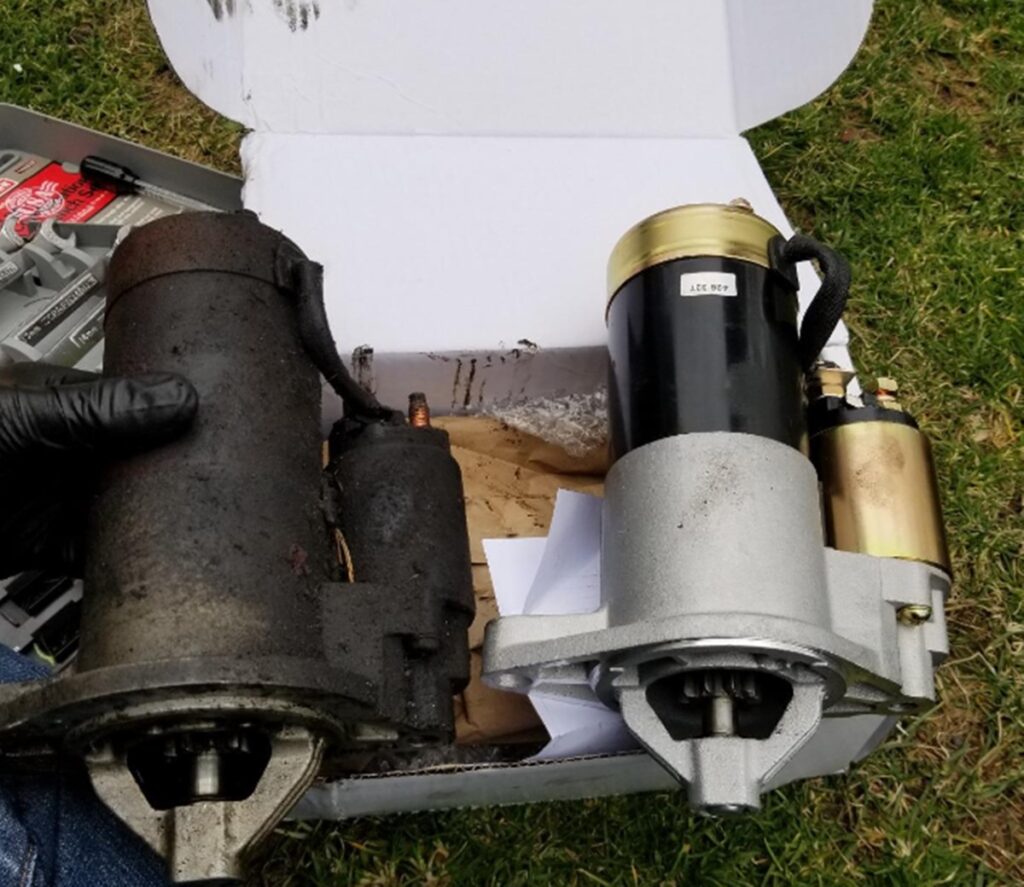
A starter is an electric motor that engages the engine’s flywheel in order to start the vehicle. The starter needs to be powerful enough to turn over the engine, but it also needs to be durable enough to withstand years of use.
One way to ensure that starters are both powerful and durable is to insulate them against heat and vibration. This insulation helps to protect the starter’s delicate internal components from damage, ensuring a long lifespan. In addition, it helps to keep the starter cool, which makes it more efficient and less likely to overheat.
When the insulation on the starter breaks down, it can cause the starter to overheat. This can lead to smoke coming from the starter, and potentially even a fire.
Additionally, it can damage the contacts on the starter, making it difficult for the starter to engage. It can also cause the starter motor to seize up, making it impossible for the engine to turn over.
To check the insulation on the starter, disconnect the battery and remove the starter. Then, use a multimeter to measure the resistance between the body of the starter and the terminal. If the readings are higher than 10 ohms, then the starter is most likely fine.
However, if the readings are lower than 10 ohms, then the starter needs to be replaced. By regularly checking the insulation on your starter, you can help ensure that your vehicle starts reliably every time.
8. Corrosion
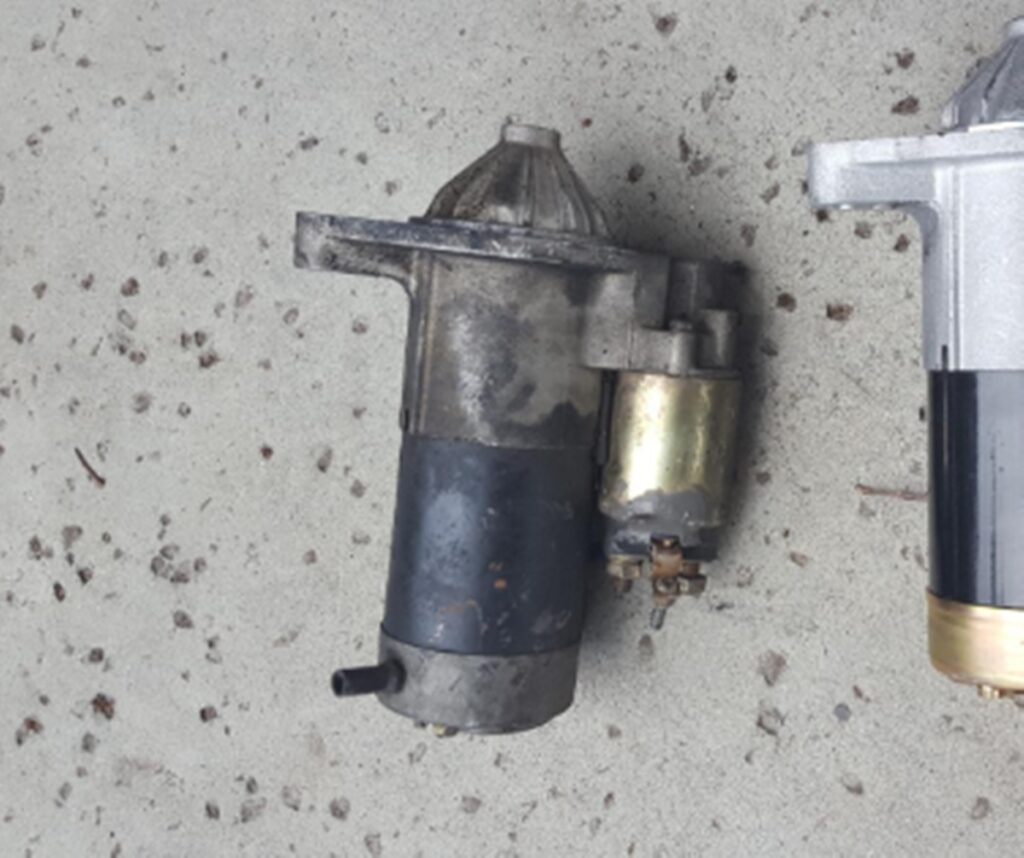
Car starters are an essential component of any vehicle, but they can also be susceptible to corrosion. This is often caused by moisture and salt build-up, which can damage the starter and reduce its lifespan. In some cases, corrosion can even lead to starter failure.
While most car starters are made of durable materials that can withstand years of wear and tear, they do have some metal parts that can corrode over time.
The most susceptible area is usually the solenoid, which is responsible for connecting the starter motor to the battery. If this part becomes corroded, it can cause the starter to smoke when you try to start the car.
In order to protect your starter from corrosion, be sure to clean any dirt or grime off of the solenoid regularly, and consider applying a coat of anti-rust spray to help extend its lifespan. With proper care and maintenance, your car starter should be able to withstand years of use.
However, if you notice any problems, be sure to take it to a mechanic as soon as possible. By catching corrosion early on, you can save yourself a lot of money and hassle in the long run.
9. Dirt or dust buildup that gets ignited from the heat
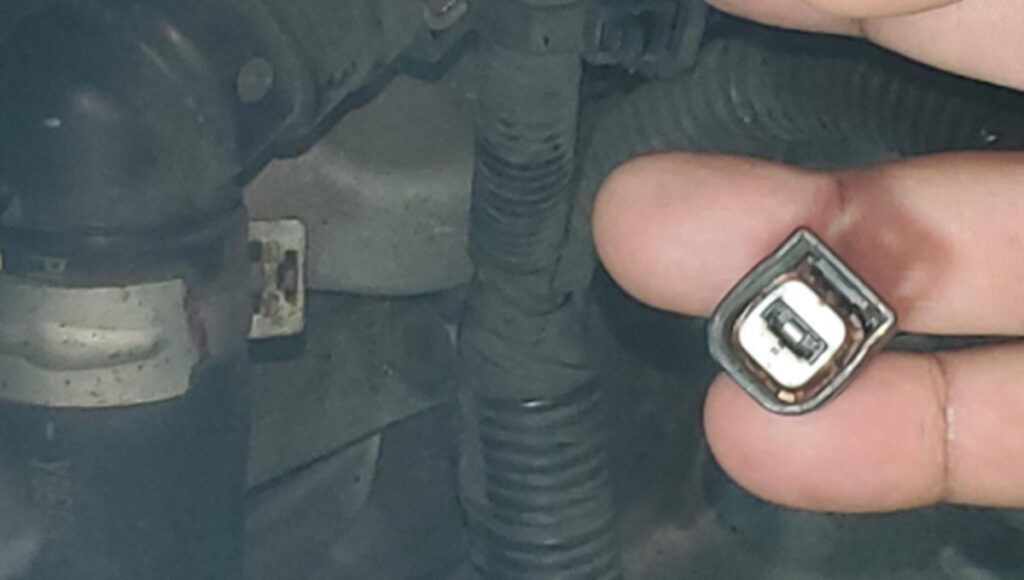
The starter is a pretty much closed system. This means that there are no open holes like you will find on an alternator. The only exposed place of a starter is around the electrical connectors and inside of them.
Over time, dirt and dust can get buildup on the electrical connectors and when you try to start the car, the electrical current that flows through them is so high, it can actually ignite the dirt and dust causing the starter to smoke.
To prevent this, it is important to check the wiring connections from time to time and clean them by using an air compressor. If you notice any serious dust buildup, you might want to check the plastic around the connectors for damage.
How To Test a Car Starter
Testing a car starter involves several steps including physical inspection of the starter, checking the battery, and performing voltage and bench tests.
Physical Inspection
The first step in testing a car starter is to physically inspect it. This involves locating the starter in your car – typically, you can identify the positive terminal of the battery and then follow the positive battery cable to find the starter. Look for any obvious signs of damage such as frayed wires, corrosion, or loose connections. If any of these issues are present, they could be causing your starter problems.
Checking the Battery
Next, you should check the condition of your car’s battery. A weak or dead battery won’t provide enough power to the starter, which can prevent your car from starting. Use a multimeter to measure the voltage of the battery – if it reads less than 12.6 volts, your battery may be the issue, not the starter.
Voltage Test
A voltage test can help determine if power is actually reaching the starter. For this, you’ll need to use a voltmeter or multimeter. Connect one end of the meter to the positive terminal on the starter and the other to a good ground point. Ask someone to attempt to start the car while you read the meter. If the meter reads 12 volts or more, power is reaching the starter, indicating the starter itself may be the issue.
Bench Testing
Bench testing is another effective way to test a car starter. This involves removing the starter from the vehicle and testing it on a workbench. Connect jumper cables to a charged battery and the starter – the negative cable to the starter body and the positive cable to the solenoid. If the starter spins, it’s likely working properly. If it doesn’t spin, the starter is likely faulty says CarTalk.
Can I Still Drive My Car If The Starter is Smoking?
Driving a car with a smoking starter is not recommended as it indicates a serious underlying issue that could potentially lead to more severe damage or even a fire.
When the starter of a car begins to smoke, it’s usually a sign of an electrical or mechanical problem. This could be due to a short circuit, damaged wiring, faulty components, or unusual resistance from the engine.
These issues are not only a potential risk to your vehicle’s functionality, but they can also pose a safety hazard.
Ignoring such signs and continuing to drive the car can lead to more significant problems down the line.
The starter could fail completely, leaving you stranded. Worse, if the issue is a short circuit or a similar electrical problem, there’s a risk of an electrical fire, which could be extremely dangerous.
FAQs
Q: What are the consequences of a smoking starter?
A: A smoking starter can lead to several consequences. It can cause damage to the starter motor itself, requiring it to be replaced. It can also cause damage to the surrounding components, such as the wiring and solenoid. In some cases, a smoking starter can prevent the engine from starting or cause it to run poorly.
Q: How can I fix a smoking starter?
A: Fixing a smoking starter requires identifying and addressing the underlying issue. Depending on the cause of the smoking, it may be necessary to replace the starter motor, solenoid, or wiring. It is best to have the problem diagnosed by a professional mechanic who can recommend the appropriate repairs or replacements.
Q: Can a smoking starter be repaired or does it always need to be replaced?
A: Whether a smoking starter can be repaired or needs to be replaced depends on the extent of the damage and the underlying cause of the smoking. In some cases, it may be possible to repair or replace specific components of the starter. However, if the damage is severe or the starter motor itself is faulty, it may be more cost-effective to replace the entire starter.
Q: How long does it take to fix a smoking starter?
A: The time it takes to fix a smoking starter can vary depending on the cause of the issue and the availability of replacement parts. In some cases, a smoking starter can be repaired or replaced within a few hours. However, if the problem is more complex or specific parts need to be ordered, it may take longer to complete the repairs.
Q: How much does it cost to fix a smoking starter?
A: The cost of fixing a smoking starter can vary depending on the make and model of your car, the extent of the damage, and the cost of replacement parts. On average, you can expect to spend anywhere from $200 to $500 for parts and labor. It is recommended to get a quote from a mechanic or auto repair shop for an accurate estimate.
Q: Can I prevent the starter from smoking in the future?
A: While some starter issues are unavoidable, there are steps you can take to potentially prevent your starter from smoking in the future. Regular maintenance, such as checking and replacing worn-out components, can help prolong the lifespan of your starter. Avoiding excessive cranking of the engine and addressing any starting or ignition issues promptly can also help prevent starter problems.
Q: Is a smoking starter covered by warranty?
A: Whether a smoking starter is covered by warranty depends on several factors, such as the age of the car and the specific terms of the warranty. Typically, starter issues would be covered under a new car warranty if the car is still within the specified warranty period. If your car is no longer covered under warranty, you may need to cover the costs of repairs yourself or through an extended warranty if applicable.
Conclusion and final thoughts
In conclusion, it is important to always stay vigilant and aware of your surroundings when starting your car.
The act of smoking while attempting to start a vehicle may seem harmless, but it can have serious consequences.
Not only does it pose a potential fire hazard, but it also puts unnecessary strain on the starter and other components of the car.
